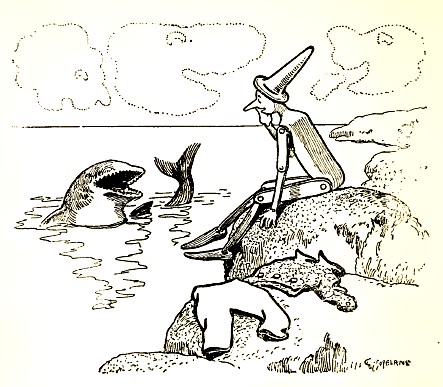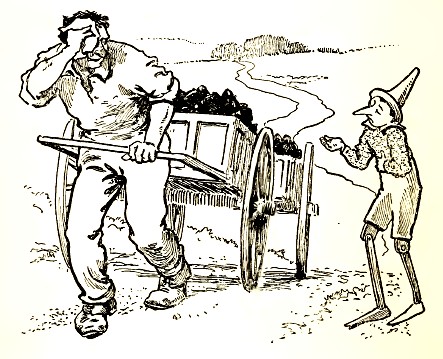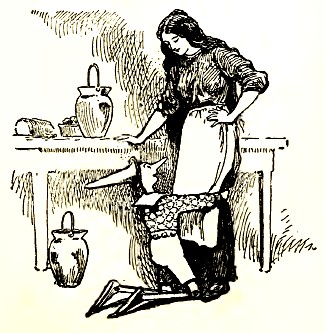| Web
and Book design,
Copyright, Kellscraft Studio 1999-2018 (Return to Web Text-ures) |
 (HOME)
|
CHAPTER 24 Animated
by the hope of arriving in time to save his father, Pinocchio swam all
night.
And what a horrible swim that was! It rained, hailed, thundered, and
lightened
so hard that the night appeared like day. In the
morning he saw a shore line. It was an island in the middle of the sea.
He
tried to reach that sand bank, but it was useless. The waves tossed him
about
like a straw. At last, by good fortune, there came a tremendous wave
that
hurled him right upon the shore. The force with which he struck the
ground was
so great that it nearly broke his bones; but he said, "I have been very
lucky to escape this time." In the
meantime the weather cleared. The sun appeared in all its splendor and
the sea
became as smooth as oil. Then the marionette laid his clothes out on
the sand
and sat in the sun to dry himself. He looked all around, but he saw
nothing of
the little boat that contained his papa. "I
should like to know the name of this island," he said to himself. "I
should like to know, at least, if it is inhabited by kind people who do
not
hang boys to trees; but whom can I ask if there is no one here?" The idea
of finding himself alone on an island in the sea made him very sad and
he began
to cry. Suddenly he saw, passing by not very far from shore, a large
Fish, who
went about his business quietly with his head above the water. The
marionette
called in a loud voice, so as to make himself heard, "Hello, Mr. Fish!
Will you allow me one word?" "Two,"
replied the Fish, who was so polite a dolphin that it would be hard to
find his
equal in the sea. "Will
you please tell me if in this island I can find something to eat
without being
eaten?" "I
am sure of it," replied the Dolphin. "You will find some people not
far from here." "And
what street must I take?" "Take
that little road to the left and follow your nose. You cannot mistake
it." "Tell
me, please, another thing. You travel so much in the sea, both by day
and by
night, that perhaps you have seen a little boat with my papa in it." "And
who is your papa?" "He
is the best in the world, and I am the worst son that can possibly be."
"With
the terrible storm that we had last night the boat must have sunk." "And
my papa?" "By
this time he must have been swallowed by the Dogfish who for several
days has
been playing havoc in these waters." "Is
the Dogfish very large?" asked Pinocchio, who already trembled with
fear. "Large?"
replied the Dolphin. "Why, you can get an idea of him when I tell you
that
he is as large as a five-story house and his mouth is so big that he
can
swallow, at one gulp, a train of cars with the engine attached!" "Oh,
dear me!" cried the marionette, very much scared. Turning to the
Dolphin,
he said hurriedly, "Good-by, Mr. Fish; excuse me, and a thousand thanks
for your kindness." Having
said this, Pinocchio took the little road and ran as quickly as he
could. At
every slight noise he heard he looked around, for fear he might be
followed by
the terrible Dogfish as big as a five-story house, and with a mouth
large
enough to swallow a train of cars with the engine attached. After
having run for half an hour, he arrived at a little country called "The
Country of the Busy Bees." The streets were filled with those who ran
here
and there attending to their little duties, everybody having something
to do. "I
understand!" exclaimed that good-for-nothing Pinocchio. "This country
is not for me. I was not born to work." Meanwhile
he was very hungry because he had eaten nothing for twenty-four hours,
— not
even a chick pea. What could he do? There were only two ways to get
food, — either
to beg or to work for it. To ask for alms he was ashamed, because his
papa had
told him that the only ones who had a right to beg were the truly poor,
sick,
or blind. The poor deserve help as do those also who are too old to
work. All
the others must do something, and if they suffer from hunger it is the
worse
for them. Just then there passed a man, all perspiring, who was pulling two wagons filled with coal. Pinocchio, judging from his face that he was a good man, lowered his eyes for shame, and said in an undertone, "Will you please give me a penny? I am dying of hunger."  "Not
a cent," replied the coal man; "but I will give you five if you will
help me pull this wagon up the hill." "I
am surprised," replied the marionette, almost offended. "I was not
made a mule; I have never pulled a wagon in all my life." "The
worse for you!" replied the coal man. "Then, my boy, if you are dying
with hunger, eat a couple of slices of your pride and take care that it
does
not give you indigestion." After a
few moments a bricklayer passed along, carrying on his shoulder a
basket of
lime. "Good
gentleman, will you be kind enough to give a penny to a poor boy who is
dying
with hunger?" "Come
with me, and I will give you five if you will carry a basket of lime
for
me." "But
the lime is heavy," replied Pinocchio, "and I do not want to get
tired." "If
you do not want to get tired, my boy, go hungry. Good-by." In less
than half an hour twenty other people walked by and they all said to
Pinocchio:
"Shame on you! Instead of finding a little work and earning some money,
you stand there and beg like a vagabond." Finally
along came a good woman who carried two pitchers of water. "Will
you be so good as to give me a sip of water?" asked Pinocchio, who was
burning with thirst. "Certainly,
my boy," said the good woman; placing the two pitchers on the ground. When
Pinocchio had drunk like a sponge he muttered, drying his mouth, "If I
could only eat as much as I drank!" The good
woman, hearing these words, replied quickly, "If you will help me carry
one of these pitchers of water up the hill, I will give you a nice
piece of
bread." Pinocchio
looked at the pitchers of water and did not say Yes or No. "And
with the piece of bread I will give you a piece of cauliflower dipped
in oil
and vinegar." Pinocchio
gave another glance at the pitcher and did not say Yes or No. "And
after the cauliflower I will give you a piece of cake." At this
Pinocchio could resist no longer. He said, "Pshaw! I will carry the
pitcher to your home." The pitcher was very heavy, and not being able
to
carry it with his hands he put it on his head. After they arrived at
the house
the good woman prepared the table and gave the marionette all that she
had
promised. Pinocchio did not eat; he gorged. He was so hungry that one
would
think he had not eaten for a week. At
length, having satisfied his hunger, he raised his head in order to
thank his
benefactress. Hardly had he looked at her when he uttered a long
"Oh-h-h-h!" of surprise. He remained seated as if transfixed, with
his eyes opened wide, his fork in the air, and his mouth full of bread
and
cauliflower. "What
is the matter?" the good woman asked, laughing. "What!"
replied Pinocchio, stuttering. "What! — how you resemble — yes! yes!
yes!
— with the blue hair, too, just like her! Oh, my little Fairy, tell me
that it
is you! Do not let me cry any more! If you only knew how much I have
cried! — how
much I have suffered!" And saying this, Pinocchio wept a flood of tears and, throwing himself on his knees, clung to the mysterious woman.  |